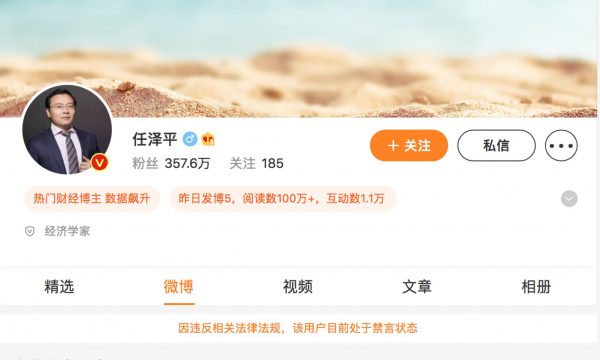Chinese economist and influencer Ren Zeping was banned from Weibo on Jan. 12 after publishing a string of audacious posts stating authorities should print extra money to pump up the birthrate.
In an article published Monday to his WeChat account, Ren sparked lively public debate by proposing to establish a fertility encouragement fund by issuing 2 trillion yuan ($314 billion) via the central bank to raise the birth rate to 50 million in 10 years.
“This can solve China’s low-birth and aging-population problems and energize the future without burdening people, companies, and local governments,” Ren stated firmly.
“Based on our studies, this is the only, and the most practical, solution,” he added. The article has since been deleted.
Ren added that “we must seize the window of time when people born between 1975 and 1985 can still have children,” Instant China reported.
Censored
Success
You are now signed up for our newsletter
Success
Check your email to complete sign up
Visitors to Ren’s Weibo account were greeted with the message: “Due to a violation of relevant laws and regulations, this user is currently in a muted status.” Ren’s previous postings on the account were still visible.

A message on the Weibo page of China economist and online influencer, Ren Zeping shows Ren has been denied posting on Twitter-like the social media platform after he suggested the central bank print 2 trillion yuan (US$314 billion) to support the birth of 50 million babies over the next ten years. (Image: Weibo screenshot)
Ren is a former chief economist at the real estate giant Evergrande Group and a former economist at the head of the Heung Great Economic Research Institute.
He joined the All-China Certificate, a Beijing-based think tank focusing on public-policy studies, in March 2021 and has long been candid about China’s demographic issues.
READ MORE: China Authorities Launch 3-Child Policy; Urge Party Members to Set an Example
He has been very engaged on social media with more than 3.5 million followers on Weibo while publicizing observations on social and economic issues and advertising books.
Backlash
The embargo of Ren being on Weibo and WeChat attracted more than 3 million views on Weibo as of Wednesday night, with diverse reactions, some of which indicated that his theories were unworkable and short of common sense.
But Ren reiterated his views during a live stream aired on Monday, articulating that printing money to boost birth rates would become an actuality in the years to come.
Some analysts, however, argued that 4 trillion worth of stimuli would exhaust local governments’ resources and would cause skyrocketing debts fuelling inflation.
Based on the opinion of industry insiders, a report, published by the 21s Century Business Herald stated, “Asking the People’s Bank of China to print 2 trillion yuan is a subject of great significance that needs meticulous argument,” South China Morning Post (SCMP) reported.
“[Ren’s] opinions might be provocative and receive some responses,” said the 21st Century Business Herald, continuing, “ but it is too hasty. We have seen the screenshot he posted of his followers seconding his suggestions that the country needs to print money to support childbirth, but the solution to the aging population is never easy.”
“If the mass public believed that China should print money to stimulate childbirth, its consequences [would be grave], and the policymakers would not want to see that,” it added.














